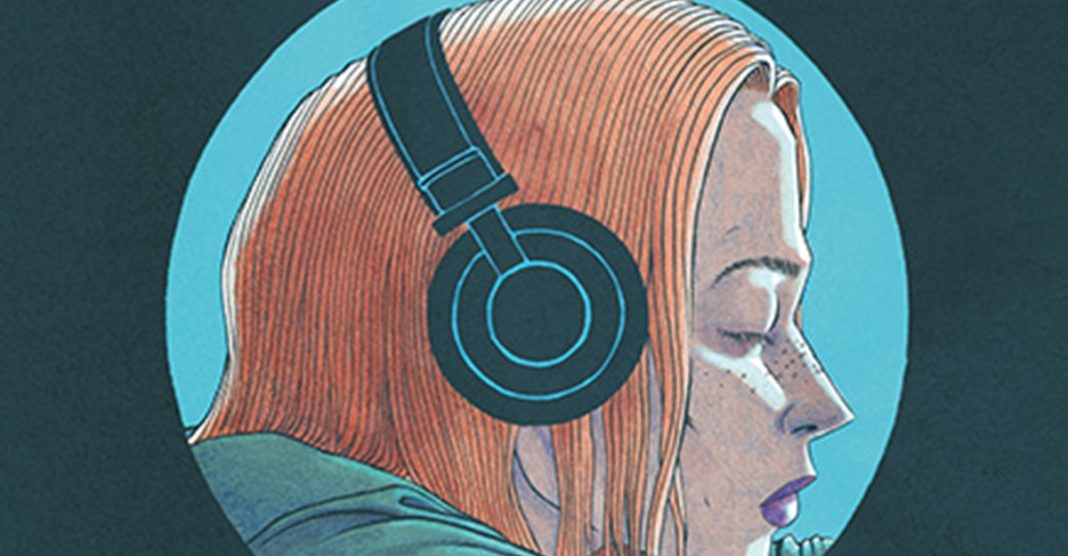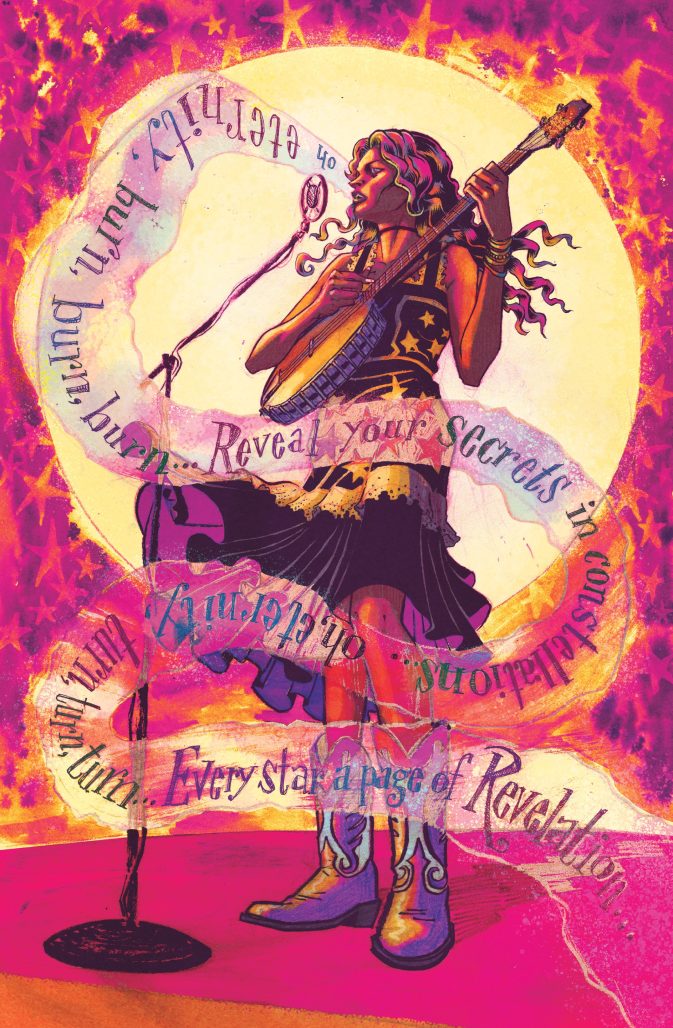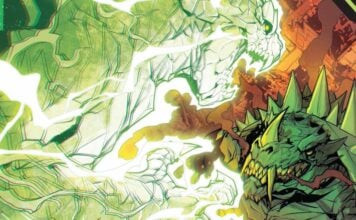 Spectrum
Spectrum
Writer: Rick Quinn
Artist: Dave Chisholm
Publisher: Mad Cave Studios
Collects: Spectrum #1-6
Publication Date: July 2025
Melody Parker and Ada Latimer inhabit two very different worlds, yet both feel the sting of isolation and aching need for connection, for recognition. They yearn for something that reminds them that the world is not indifferent to their existence, like many of the people in their lives seemingly were over the years. But how can you really connect to another person? How can you inhabit what they think and feel in a way that’s just as real for you as it is for them?
That question sets them on a journey to find themselves through art, to show how music and writing can shape our realities and to see each other in a way unlike anything else.
Spectrum — by Rick Quinn and Dave Chisholm — is a six issue mini series that follows Melody and Ada as they’re confronted by the mysterious cosmic being, Echo, that seems to know more about them than they know about themselves. While on the run, they discover the power to change the world through music, and spend the series uncovering what it’s done to their past and what it might mean for their future.
Spectrum’s animating idea is that art is akin to a physical force, one that re-shapes reality for the artist and audience alike. We bring the world we see in our mind’s eye into existence, and by the same token we can reshape the world into a better image, one that reflects who we are and how we want to connect with others. The series opens by unleashing the sheer horror of that understanding, wildly blending past and present, music and literature, into a chaotic chorus dictated by Melody’s own confusion. Word balloons clutter the page, our eyes wildly swing from left to right and right to left, even the style of art for each figure feels unique, adding to the sheer noise of the moment.
Chisholm’s work here is stunning, combining a variety of styles and panel layouts to force the reader into shifting their own perspective to understand how the music and the art makes the world feel different. The work here embodies the notion that there’s no such thing as art that’s a purely passive experience. Whether you’re reading, watching a movie or listening to a song, all art requires effort and engagement from the audience that bridges the gap between the two and constitutes a new reality. Every work requires us to shift our focus attentively and bring the art to life.
Every sequence of music or every story about an artist that we experience transforms our perspective of the world, shifting the colors and lettering around until it unlocks a subtle recognition of what this particular sound, what this particular person, or what this particular moment in history really feels like. More than once, I would turn the page and find something awe inspiring, slowing down the pace of the story to appreciate and rest on the music being played.
Rick Quinn does a great job here of forcing the reader to trust him, presenting so much information that you have no choice but to surrender control and let the story take you on its journey. Like Melody and Ada, we want to make sense of it but that can’t even begin to happen until we see the big picture first. The experience, the feeling induced by the art has to move us and only after that can we look back to make sense of the chaos.
But on the flip side: this power of art that we grapple with has its own demands, its own sense of responsibility that can possess you. Being an artist, or wanting to be one, is a kind of burden that can burn you up from the inside or force you outside the very reality you seek to transform.
The story of Spectrum is the story of so many adults, parents and past artists misjudging the weight that art would have on them and the world, misjudging their place in the lives of others. The cruelty of finding hope and love in art is that we come to it to fill a void within us, a void that can itself be left by those who pursued art and lost themselves. We get closer to the artist through that specific medium of their choosing, but a medium is still some other force, something facilitating the understanding, putting us at a remove from the person.
This is what feels so unsettling about Echo as our primary antagonist. From the second that it starts, every song is moving towards its conclusion. Every sound is always temporary. Every change in the world, every feeling we experience that leaves us transformed does, eventually, have to burn out into the distant future.
Echo is not so much a villain as much as a natural force that’s overeager about their purpose and finds us heading towards an instrumentality and flatness of experience that only proves their point. The world isn’t just indifferent to Melody and Ada, it’s simply indifferent to all. And if that’s where we are, who’s to say we haven’t already arrived at the echo at the end of civilization?
All of this makes for a satisfying experience issue-to-issue, though I did find myself disappointed by Spectrum’s resolution in the form of a Kaiju showdown. It’s a fun idea, but one that feels a little too simple with respect to the larger concepts at play in the series. The more Spectrum moves into lore rather than re-creating the sensation of art, the more it tries to pad in action sequences rather than focusing on the way music can be visualized, the more it loses me.
These tendencies aside, Spectrum is a great comic and one that captures the sensations and chaos of art as an experience. Your confusion is as important an experience as your understanding, the two concepts dance on the page to create a captivating story of what it feels like love art, and to make art for the love it.
Spectrum is available now
Read more great reviews from The Beat!
















